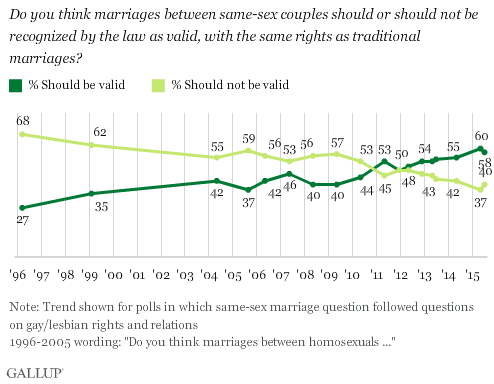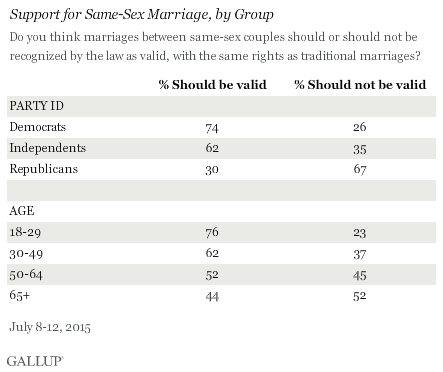Story Highlights
- Public support about the same as before Supreme Court ruling
- Republicans, seniors remain most opposed to gay marriage
- Democrats, adults younger than 30 show greatest support
WASHINGTON, D.C. -- Americans' views on gay marriage are stable following the U.S. Supreme Court's recent ruling that made same-sex marriage a right nationwide. The nearly six in 10 Americans (58%) who say gay marriages should be valid is similar to Gallup's findings in May.

These data are from a July 8-12 Gallup poll, conducted about two weeks after the Supreme Court's 5-4 decision in Obergefell v. Hodges legalized gay marriage nationwide. The court's ruling on the practice, which was legal in the majority of states, so far has not affected the way Americans feel about the issue.
However, the decision was consistent with American public's opinion on the issue. Americans' support for gay marriage has increased over time, from 27% in 1996, the first time Gallup asked about it, to the current 58%. A consistent majority has favored it since 2011, including a high of 60% in May of this year. The two-percentage-point difference between the May and July estimates is not statistically meaningful.
Politically, Democrats (74%) are most likely to support same-sex marriage, followed by independents (62%). Republicans (30%) remain least likely to support it, with a majority (67%) still opposed.

American adults younger than 30 remain the most supportive of gay marriage among age groups. Majorities of those aged 30 to 49 (62%) and 50 to 64 (52%) also say same-sex marriages should be valid.
Bottom Line
Though the Supreme Court's decision has not immediately influenced Americans' overall opinion on the issue of same-sex marriage, this is not to suggest it will not affect opinion in the long run.
Even after a 1967 Supreme Court decision that legalized interracial marriages, Gallup's polling in 1968 found that only one in five Americans (20%) approved of such marriages. It took three more decades to reach a majority of support.
The path to legality of interracial marriage differed from same-sex marriage, though, in that the Supreme Court led public opinion by legalizing something that Americans largely disapproved of at the time. Approval of same-sex marriage, however, has ascended significantly faster, and has enjoyed majority support for a few years before the court's decision. Still, a long view of the trend on gay marriage illustrates that support for it was steady and incremental, and that the movement's big victories in statewide ballot initiatives and legislature-enacted laws had limited effect on public opinion at large.
Survey Methods
Results for this Gallup poll are based on telephone interviews conducted July 8-12, 2015, with a random sample of 1,009 adults, aged 18 and older, living in all 50 U.S. states and the District of Columbia. For results based on the total sample of national adults, the margin of sampling error is ±4 percentage points at the 95% confidence level. All reported margins of sampling error include computed design effects for weighting.
Each sample of national adults includes a minimum quota of 50% cellphone respondents and 50% landline respondents, with additional minimum quotas by time zone within region. Landline and cellular telephone numbers are selected using random-digit-dial methods.
View complete question responses and trends.
Learn more about how Gallup Poll Social Series works.

